The minutes of the February 8 meeting of the Bank of England's Monetary Policy Committee (MPC) showed a 7-2 vote to leave rates on hold this month. The two members in favor of another hike thought that the 75bp of tightening since last August was too modest given the rise in inflation. The majority were concerned that a closely-spaced series of rate increases could lead to "excessive tightening." However, the members seem still to be concerned about medium-term inflation risks, a concern also underlined in last week's Inflation Report (see Daily Global Commentary, February 14: "Bank of England Says One More Rate Hike Will be Necessary"). All told, the minutes, along with data releases of the past few days, point to another rate increase - but probably not until the April 5 or May 10 meeting.
Today the Confederation of British Industry (CBI) released its monthly manufacturing survey for February, which found that factory orders rose at their fastest pace in almost twelve years. The monthly order books balance rose from -9 in January to +4 in February - the highest since June 1995 - while the output expectations balance climbed from +12 to +28, the highest level since May 1995. The CBI concluded that this climate of strengthening demand is encouraging manufacturers to feel more confident about raising prices, with the price expectations balance remaining at +19.
Yesterday came the news that, while consumers are getting more cautious about wielding their credit cards, the housing market remains robust. The British Bankers' Association reported that credit card lending fell for the sixth straight month in January. This comes as no surprise in the wake of last week's data showing that the volume of retail sales dropped 1.8% on the month in January, the sharpest fall in four years.

On the other hand, underlying net mortgage lending rose by £5.6 billion in January, down only slightly from £5.7 billion in December and about even with the average of the previous six months. Data from the Building Societies' Association showed that mortgage approvals, a forward looking indicator of housing demand, rose a seasonally adjusted £5.949 billion last month, the highest level on record.
In a report made to parliament's Treasury Committee on Monday, the Bank of England warned that the unusually low and stable inflation of the past decade may not last, pointing to sharply rising asset prices and to the possible inflationary impact of strong money supply growth. Yesterday's provisional money supply data showed annual broad money growth picked up to 13.0% last month from 12.8% in December.

Given the concerns of some MPC members over too-rapid a series of rate hikes, we expect the Bank of England to hold its target interest rate steady at 5.25% at the March 8 meeting - assuming there are no nasty inflationary surprises before then. But, with concerns over the medium-term inflation outlook lingering, one more rate hike looks probable. As to whether that comes on April 5 or May 10, we are left with the mantra of "watch the data."















